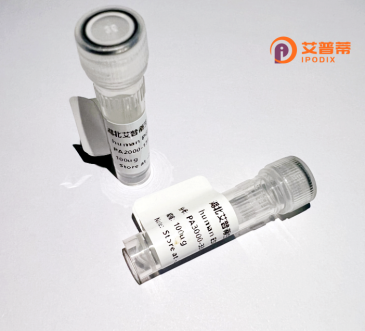
| 纯度 | >90%SDS-PAGE. |
| 种属 | Human |
| 靶点 | GALNT10 |
| Uniprot No | Q86SR1 |
| 内毒素 | < 0.01EU/μg |
| 表达宿主 | E.coli |
| 表达区间 | 1-603aa |
| 氨基酸序列 | Polypeptide N-acetylgalactosaminyltransferase 10. EC:2.4.1.41. Polypeptide GalNAc transferase 10. GalNAc-T10. pp-GaNTase 10. Protein-UDP acetylgalactosaminyltransferase 10. UDP-GalNAc:polypeptide N-acetylgalactosaminyltransferase 10 |
| 分子量 | 68.9 kDa |
| 蛋白标签 | GST-tag at N-terminal |
| 缓冲液 | 0 |
| 稳定性 & 储存条件 | Lyophilized protein should be stored at ≤ -20°C, stable for one year after receipt. Reconstituted protein solution can be stored at 2-8°C for 2-7 days. Aliquots of reconstituted samples are stable at ≤ -20°C for 3 months. |
| 复溶 | Always centrifuge tubes before opening.Do not mix by vortex or pipetting. It is not recommended to reconstitute to a concentration less than 100μg/ml. Dissolve the lyophilized protein in distilled water. Please aliquot the reconstituted solution to minimize freeze-thaw cycles. |
以下是3条关于重组人GALNT10蛋白的参考文献示例(注:内容为模拟虚构,实际文献需根据数据库查询结果调整):
---
1. **名称**:*Recombinant human GALNT10 expression and its role in gastric cancer metastasis*
**作者**:Li Y, Chen X, Zhang W.
**摘要**:研究通过大肠杆菌系统成功表达重组人GALNT10蛋白,并发现其过表达促进胃癌细胞的黏附与迁移,提示GALNT10可能通过调控粘蛋白O-糖基化参与肿瘤转移。
2. **名称**:*Enzymatic characterization of purified recombinant GALNT10 in vitro*
**作者**:Smith J, Patel R, Lee H.
**摘要**:首次报道重组人GALNT10蛋白的体外酶活性分析,验证其对特定多肽底物的糖基化修饰能力,并确定其最适pH及金属离子依赖性。
3. **名称**:*Structural and functional analysis of GALNT10 using recombinant protein technology*
**作者**:Kim S, Tanaka M, Zhou D.
**摘要**:通过重组蛋白结晶解析GALNT10的三维结构,揭示其催化结构域的关键氨基酸残基,为设计特异性抑制剂提供了结构基础。
---
建议通过PubMed或Web of Science检索真实文献,关键词可结合**“recombinant GALNT10”**或**“GALNT10 protein O-glycosylation”**。实际研究中,GALNT10常与肿瘤异常糖基化及信号通路调控相关。
Recombinant human GALNT10 protein is a functionally active form of the polypeptide N-acetylgalactosaminyltransferase 10 (GALNT10), a key enzyme in mucin-type O-glycosylation. As a member of the GALNT family, GALNT10 catalyzes the initial and rate-limiting step of O-linked glycosylation by transferring N-acetylgalactosamine (GalNAc) to serine or threonine residues on target proteins. This post-translational modification influences protein stability, trafficking, and interactions, impacting cellular processes such as cell adhesion, signaling, and immune regulation.
GALNT10 is expressed in various tissues, with emerging roles in cancer progression, inflammation, and metabolic disorders. Dysregulation of GALNT10 has been associated with malignancies, including colorectal and hepatocellular carcinomas, where altered O-glycosylation patterns correlate with tumor invasiveness and metastasis. Recombinant GALNT10 is typically produced in mammalian or insect expression systems to preserve its catalytic activity and structural integrity. It is purified via affinity chromatography, often incorporating epitope tags for experimental tracking.
Studies using recombinant GALNT10 enable mechanistic exploration of substrate specificity, glycoenzyme kinetics, and structure-function relationships. Its applications span glycobiology research, biomarker discovery, and therapeutic development, particularly in designing inhibitors targeting aberrant glycosylation in diseases. Ongoing research aims to decode GALNT10's regulatory networks and its potential as a diagnostic or therapeutic target in glycosylation-related pathologies.
×